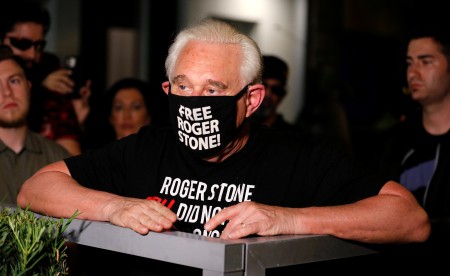By Andrew Goudsward
WASHINGTON (Reuters) – Top U.S. Justice Department officials during President Donald Trump’s administration took part in a decision to reduce prosecutors’ recommended prison sentence for Trump adviser Roger Stone in 2020, a watchdog report published on Wednesday found.
The report by the department’s internal reviewer found that the top federal prosecutor in Washington D.C. at the time, Timothy Shea, showed “ineffectual leadership” in his handling of the case, but did not conclude that officials committed misconduct or were influenced by politics.
The Justice Department’s unusual decision to ease its initial sentencing recommendation for Stone, a longtime associate of Trump, became a political flashpoint.
Four prosecutors assigned to the case withdrew and one later told a congressional committee that his office received pressure from senior department officials who feared Trump.
Stone was convicted of obstruction, witness tampering and lying to Congress during its investigation into alleged Russian interference in the 2016 presidential election. He was sentenced to 40 months in prison, but Trump later pardoned him.
Stone told Reuters the report’s conclusion about the lack of political influence is “entirely consistent with what my lawyers and I said at the time.”
The report from the Justice Department’s inspector general found that, before the first recommendation was filed in February 2020, senior officials had concerns that a sentence within the range called for by federal guidelines would be unreasonable.
Timothy Shea, then acting U.S. prosecutor in the capital, sought advice from Trump’s attorney general, William Barr, and the two discussed requesting a sentence below the guidelines. But Shea later authorized prosecutors to seek a prison sentence of between 87 and 108 months, within the guidelines, according to the report.
Barr told staff the recommendation did not reflect what he had discussed with Shea and needed to be “fixed,” according to the report. Several hours later, Trump also tweeted criticisms of the recommendation, and shortly afterwards prosecutors revised their request to seek an unspecified lesser sentence.
Barr declined to sit for an interview with the inspector general’s office and declined to comment to Reuters.
Shea did not immediately respond to a request for comment.
The report acknowledged that Barr and Shea’s role in the episode raised questions but found there was no law or department policy that barred them from intervening in the sentencing recommendation.
(Reporting by Andrew Goudsward; Additional reporting by Sarah N. Lynch; Editing by Scott Malone and Kevin Liffey)












